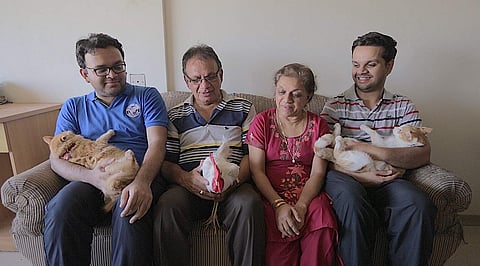

Though made in 2018, the short film Tungrus and the Chicken From Hell crept back into our consciousness not just because film critic Anupama Chopra recently recommended it, but more so because of the lockdown. To quickly take you through the plot of this 2020 Oscar-qualifying film: The Bhardes, a family of four living in Mumbai, reside in their cramped yet cosy apartment with their two cats — Ginger and Garlic — and a boisterous rooster that has made their lives (including the cats’) a living hell. So, the difficult moral predicament the family dabbles with is: Would it be okay to kill their own pet rooster? "Not just with fellow humans, it is difficult to remain locked in, even more, when an irritating rooster is involved. Indeed, the premise of Tungrus takes on new shades in these times, when sharing space and tolerating differences has been at its lowest," says Rishi Chandna, the director of the movie.
Now, you must be wondering how the rooster ended up as a pet in the Bhardes household in the first place. It was brought by Mr Bharde, who comes from a village where it is natural to kill for meat the same chicken they reared. Tungrus is an open-ended and layered movie which, in its span of over 12 minutes, manages to acquaint us with the eccentric rooster's ways, like landing on people's heads, leaving droppings behind everywhere and more. Surely, the movie must have been interpreted in many ways. What's Rishi's favourite? "Writer Devashish Makhija saw the film as an allegory for what's happening in India currently — he was reading it as an insider-outsider conflict, how the insiders are unable to accept certain outsiders because of biases and prejudices," explains the director. One can watch the film in the Op-Docs section of The New York Times and MovieSaints, a platform to discover interesting films.
Rishi discovered the story of the Bhardes through his co-producer. His intention was merely to document their unusual situation, establish the rooster as a problem and point out the difference when it comes to food choices within families and societies. "Food is a personal choice that depends on upbringing and conditioning. No one should be telling us what to eat," he establishes. While Mr Bharde is all for killing the rooster, his sons, who are urban products, have a different viewpoint. "It is interesting to see the divide within the family when it comes to what should be done about the rooster. Maybe it's because the family did not have a properly defined status for the rooster — was it a pet or was it food?" mulls Rishi.
The short film did the rounds of many film festivals since it's release in 2015 and received critical acclaim but for the Bhardes, it was just about what they were going through for the past six months. "They are an intelligent and progressive family with a sense of humour. So, when they found out about the accolades the movie gathered, they just laughed at the absurdity and madness because they thought I was making a home video or it was some personal project. It was a refreshing change that they were laughing at their own follies in a country where people are busy being offended," concludes Rishi.
For more on it, check out tungrus.com
